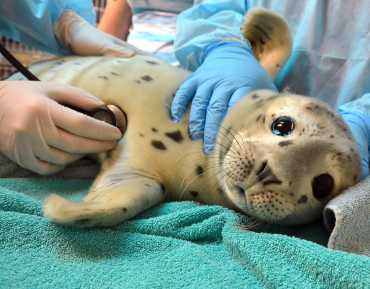
Blunt Force Trauma Injuries Due to Ship Strike Likely Cause of Death for Humpback Whale in Half Moon Bay
- Species conservation
- Pathology
The Marine Mammal Center suspects blunt force trauma injuries due to ship strike the likely cause of death for humpback whale in Half Moon Bay
Scientists at The Marine Mammal Center, the world’s largest marine mammal hospital, suspect the humpback whale that washed ashore Sunday at Manhattan Beach in Half Moon Bay died due to injuries consistent with a ship strike.
A team of experts from the Center and partners at the California Academy of Sciences performed a necropsy, or animal autopsy, on the dead whale to determine its cause of death. The Center is committed to partnering with organizations and individuals to provide data and find solutions to prevent these deaths in the future.
“This humpback whale had an extensive contusion over her right chest area, a fractured first cervical vertebra and its skull was dislocated from the spinal column,” says Dr. Pádraig Duignan, Director of Pathology at The Marine Mammal Center. “These findings, combined with overall excellent body condition, strongly implicates blunt force trauma associated with a ship strike as this whale’s cause of death.”
During Monday’s necropsy, scientists identified the humpback whale as a 49-foot adult female that was in a moderate stage of internal decomposition based on the quality of the skin, internal tissues and organs. The team also noted the whale had ample blubber and fat reserves.
While the findings of this whale necropsy are tragic, the information gathered from these whales is shared directly with the Center’s partners and helps inform policy decisions that can protect habitat areas, change shipping lane speeds that intersect migration routes and allow experts to better understand shifting food sources for marine mammals in a warming ocean.
Learn More About Humpback Whales
{"image":"\/Animals\/Wild\/Gray whale\/cropped-images\/gray-whale-angel-island-by-cara-field-c-the-marine-mammal-center-100-15-1916-1496-1610383444.jpg","alt":"","label":"Cetacean Conservation","title":"Stranding & Necropsy","link_url":"\/science-conservation\/conservation\/cetacean-conservation\/stranding-necropsy","type":"page"}

{"image":"\/Animals\/Wild\/Humpback whale\/cropped-images\/humpback-whale-calf-shutterstock-0-592-4000-1845-1602378147.jpg","alt":"humpback whale underwater","label":"Cetaceans","title":"Humpback Whale","link_url":"\/animal-care\/learn-about-marine-mammals\/cetaceans\/humpback-whale","type":"page"}

{"image":"\/Animals\/Wild\/Humpback whale\/cropped-images\/humpback-by-bill-keener-c-the-marine-mammal-center-noaa-permit-21678-0-0-4602-3594-1625873241.jpg","alt":"","label":"Cetacean Conservation","title":"Field Research","link_url":"\/science-conservation\/conservation\/cetacean-conservation\/field-research","type":"page"}

{"image":"\/Animals\/Wild\/Humpback whale\/cropped-images\/humpback-whale-facing-shutterstock-190-1-1278-999-1656459918.jpg","alt":"humpback whale underwater","title":"World-Traveling Whales","link_url":"https:\/\/www.marinemammalcenter.org\/publications\/world-traveling-whales","label":"Online Learning Resource","type":"publication"}

The public can play an important role in the conservation of whales by reporting sightings to the Center’s website. To report a dead whale or whale in distress, call the Center’s rescue hotline at 415-289-SEAL (7325). All marine mammals are federally protected, and the public should not approach any whale, alive or dead.
Humpback whales frequent the California coast to feed during the summer and fall months before migrating south to their winter calving and mating grounds off the coast of Mexico.
The Center’s researchers also study the locations and behaviors of whales in San Francisco Bay so that informed decisions can be made to better protect whales. Public funding and support for this investigatory work is essential.
Scientists from The Marine Mammal Center and the California Academy of Sciences were able to collect a series of samples during the necropsy for ongoing research projects. Typically, the California Academy of Sciences archives various parts of each specimen (baleen, pelvic bones, blubber, muscle, etc.) in their scientific research collection and makes them available to scientists from around the world.
The dead whale was first reported to The Marine Mammal Center’s response hotline by beachgoers on Sunday afternoon around 3pm. Due to the tide cycle this week, the team of scientists had a limited window to conduct the investigation safely at low tide. The Center received advance permission from the city of Half Moon Bay and California State Parks prior to conducting the necropsy.
2022 San Francisco Bay Area Whale Responses
7 gray whales, 3 humpback whales
1 malnutrition, 1 suspect orca predation, 4 ship strikes, 4 undetermined
March 5, 2022: adult female gray whale, Limantour Beach, Point Reyes National Seashore; cause of death: malnutrition
April 4, 2022: subadult female gray whale, Muir Beach, Golden Gate National Recreation Area; cause of death: ship strike
April 5, 2022: adult male gray whale, Alameda; cause of death: unknown, only limited samples taken and no necropsy performed
April 29, 2022: adult male gray whale, Rockaway Beach, Pacifica; cause of death: ship strike
May 13, 2022: adult female gray whale, Fort Funston, San Francisco; cause of death: ship strike
May 20, 2022: adult male gray whale, Don Edwards National Wildlife Refuge, Mountain View; cause of death: unknown, only limited samples taken and no necropsy performed
June 19, 2022: adult male gray whale, Slide Ranch, Marin County, cause of death: unknown, only limited samples taken and no necropsy performed
July 14, 2022: humpback whale, North Beach, Point Reyes National Seashore, cause of death: undetermined
July 17, 2022: subadult female humpback whale, Sharp Park, Pacifica, cause of death: suspect orca predation
August 28, 2022: adult female humpback whale, Manhattan Beach, Half Moon Bay, cause of death: ship strike
Yes, I want to save a life!

Yes, I want to save a life!
You’ll be giving sick and injured animals the best possible care at the Center’s state-of-the-art hospital. With your gift today, you are giving a patient a second chance at life in the wild.
See Our Latest News
{"image":"\/Animals\/Wild\/Elephant seal\/cropped-images\/wild-es-ano-nuevo-photo-by-clive-beavis-159-0-1270-992-1772151576.jpg","alt":"wild northern elephant seal at ano nuevo state park","title":"Avian Influenza Confirmed in Northern Elephant Seals","link_url":"https:\/\/www.marinemammalcenter.org\/news\/avian-influenza-confirmed-in-northern-elephant-seals","label":"News Update","date":"2026-02-26 01:00:00"}

{"image":"\/Animals\/Wild\/Gray whale\/cropped-images\/two-gray-whales-golden-gate-bridge-shutterstock-0-0-1270-992-1770234810.jpg","alt":"two gray whales under the Golden Gate Bridge","title":"The Marine Mammal Center and San Francisco Harbor Safety Committee Pilot New Vessel Operator Training Program","link_url":"https:\/\/www.marinemammalcenter.org\/news\/the-marine-mammal-center-and-san-francisco-harbor-safety-committee-pilot-new-vessel-operator-training-program","label":"Press Release","date":"2026-02-06 01:00:00"}

The Marine Mammal Center and San Francisco Harbor Safety Committee Pilot New Vessel Operator Training Program
February 6, 2026
Read More{"image":"\/Animals\/Wild\/Bottlenose dolphin\/cropped-images\/dolphinphoto-by-adam-li-c-noaa-0-0-1270-992-1769539954.jpg","alt":"A bottlenose dolphin jumps out of the water.","title":"What\u2019s the Difference Between Dolphins and Porpoises? And Other Animal Trivia","link_url":"https:\/\/www.marinemammalcenter.org\/news\/whats-the-difference-between-dolphins-and-porpoises-and-other-animal-trivia","label":"News Update","date":"2026-01-26 23:00:00"}

What’s the Difference Between Dolphins and Porpoises? And Other Animal Trivia
January 26, 2026
Read More{"image":"\/Animals\/Patients\/Sea otters\/2025\/cropped-images\/so-mooring-release-2-laurie-miller-c-the-marine-mammal-center-USFWS-permit-MA101713-1-147-8-1270-992-1770307740.jpg","alt":"Sea otter - Mooring","title":"Rescue Stories: Southern Sea Otter Mooring Named the 2025 Patient of the Year","link_url":"https:\/\/www.marinemammalcenter.org\/news\/rescue-stories-vote-for-your-favorite-marine-mammal-patient-of-2025","label":"News Update","date":"2026-01-16 10:05:08"}

Rescue Stories: Southern Sea Otter Mooring Named the 2025 Patient of the Year
January 16, 2026
Read More